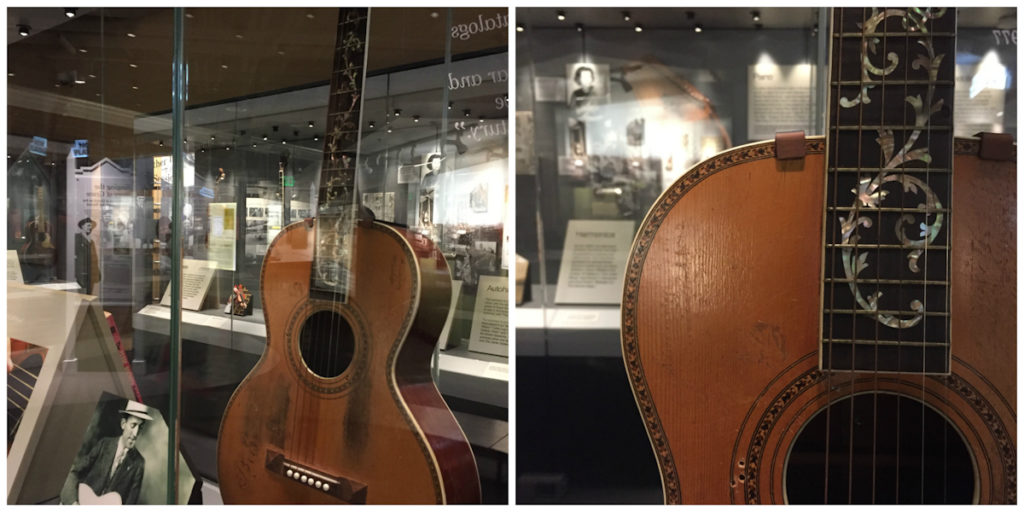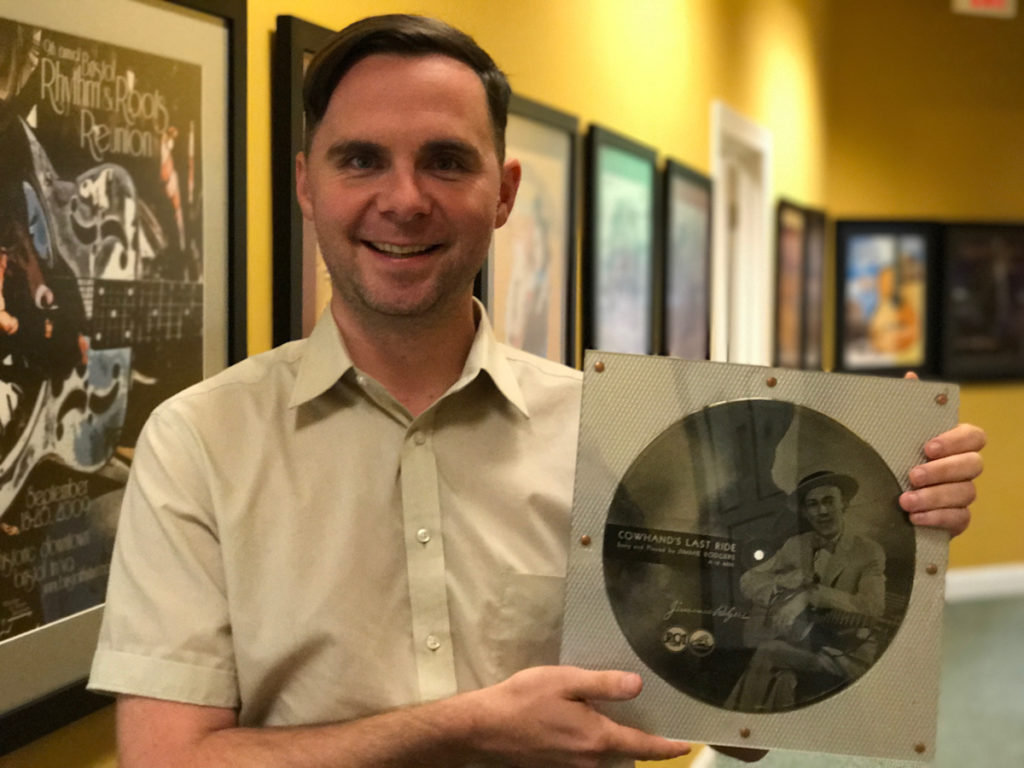Today marks what would have been the 120th birthday of America’s Blue Yodeler, the Father of Country Music – Jimmie Rodgers.
Take a second out of your busy day today and listen to just one song from Jimmie Rodgers. Any song. I promise you’ll be happy you did. That’s what I’m doing right now, listening to “I’m Free from the Chain Gang Now,” a sentimental heartbreaker of a tune, a song so powerfully delivered that in the past it has moved me to tears.

It’s hard to not become immersed in the scenes Jimmie paints through his ease of delivery and phrasing, his smooth yet edgy and warbled vocals, the sincerity of a person who truly believes in what he’s singing. But what amazes me more than anything about Jimmie’s music is how relevant and fresh it still seems today. I guess many would call his music timeless, which it certainly is – but more than that, his music has a depth that has seldom been captured on record. Jimmie’s music hits you right in the gut. It has the ability to make you laugh out loud and then make you cry; it makes you yearn for the past and look forward to the future. His music is music for the heart and soul. It’s alive. Every time I put a needle to one of his records or when the sound of his signature blue yodel cuts through my car radio speakers, I can’t help but think Jimmie is giving me a wink and a nod.
As you may already know, Jimmie Rodgers is one of the most celebrated country musicians of all, and deservedly so. Possibly no other country artist has been so heavily imitated or influential. He was much more than a hillbilly artist that could yodel (though his yodel was top of the line). Jimmie was an innovator, and a walking musical juxtaposition in the most beautiful of ways. When I think of Jimmie I think of the complex and often conflicting images he portrayed through his music – the rambler, the sentimental crooner, the caring son, and the rounder, just to name a few. Many speculate that had he lived longer, and as his appeal and development as a musician continually grew, he would have been one of the most celebrated American musicians without the constraints of genre.

Many of us in Bristol and central Appalachia are familiar with Jimmie’s story and his music. One of the reasons our organization, including the radio station, museum, and festival, exists is in large part due to the impact Jimmie had on the world. Of course, he had his first big break here in Bristol recording two sides: “Sleep Baby Sleep” and “The Soldier’s Sweetheart.” That record, just an average seller, was recorded on August 4, 1927, part of what would eventually become known as the celebrated Bristol Sessions.
Let’s be honest: those two sides didn’t exactly turn the world upside down upon their release. But the music that would soon follow sure did. Lucky for us Victor Talking Machine Company executive Ralph Peer had insight and vision, and he followed a hunch that Jimmie had a lot more to offer, inviting him for a follow-up session just a few months later at the Victor studio in Camden, New Jersey. Jimmie would hit his stride at the next session, which would yield a massive seller – “Away Out on the Mountain” and “Blue Yodel No. 1 (T for Texas)” – and from this point, he didn’t slow down. He even appeared in a movie short called The Singing Brakeman, released in 1929 for Columbia Pictures; this short is the only known video footage of Jimmie singing and features three of his well-known tunes: “Waiting for a Train,” “Daddy and Home,” and “Blue Yodel No 1.” His distinctive sound continued to develop up to his final recording session just a few days before his death from tuberculosis on May 26, 1933 at the age of 35.
But instead of giving you a recycled history lesson of the greatness that is Jimmie Rodgers, I thought it would be much more interesting and fitting to mark this day by talking to musicians who love his music like I do. And so in celebration of Jimmie on his 120th birthday, I asked some of today’s greatest country and roots musicians to reflect on his music, to talk a little about how Jimmie Rodgers influenced them and how he might be found in the music they create today. A huge thanks to all those musicians for taking the time to share their thoughts on the genius of Jimmie Rodgers:
“Jimmie Rodgers just had the juice. He guided Ralph Peer to a real sweet spot in southern music. He played the part of the rake and ramblin’ boy and may not have needed to act that much to do so. Listen to most of the other Bristol Sessions singers and you’ll hear that swagger break through the pops and crackles. Jimmie Rodgers knew he was cool, and every recording gave him a way to show everyone.”
“I was initially struck by Jimmie Rodgers’s yodeling, which I still find to be amazing. As I explore his recordings, however, I am captivated with the immense variety of accompanists he recorded with and the range of musical emotions he was able to express. He sounded great whatever the setting, from a full orchestra to just his own voice and guitar.”
“The music of Jimmie Rodgers has gone across culture since it was introduced to the world. There are musicians all the way in India that have copied Jimmie Rodgers’s sound note-for-note. While record companies marketed him towards white and hillbilly audiences, his records often found their way into black homes. The irony that a person who was rumored to have gotten the ‘blues’ in his blue yodel from listening to Tommy Johnson as he entertained white patrons at hotel parties in Mississippi and have it repackaged and purchased by people in the black community is of a particular queerness that can only exist in America. With the conversation being had at the present time about white people playing blues and other forms of black music, I wonder if we would be having this conversation if they sounded as good as Jimmie. His respect and take on music from outside of his culture should be an inspiration.”

“It seems as though Jimmie and his songs have been part of my musical life as long as I can remember. That bluesy voice, that yodel, and those songs…. I never much liked the Swiss type of yodeling but Jimmie’s made sense to me and was so much more accessible. Plus it had so much feeling in it.”
“First heard Jimmie Rodgers back in the ‘60s… I was really getting into old-time country blues…and was a fan of Emmett Miller. Jimmie Rodgers was a white guy who played and sang some blues, he was a yodeler, a singer of sentimental ballads…you name it, and he could make it his own! I admired that, he was hard to categorize! I do believe in some ways Jimmie Rodgers had an impact on my approach to building a pretty eclectic repertoire.”
“Jimmie Rodgers made his way into my music most directly through Bill Monroe and his interpretation of those songs. Of course, a serious study of Rodgers himself has followed over the years. Anyone studying modern 20th-century western music will realize just what an influence Rodgers was on almost every form of popular music, including rock n roll.”
“I think Jimmie Rodgers exists. Perhaps he’s a reclusive ghost who lives somewhere beyond the edge of the universe. Of course, proof that the Father of Country Music walked among us can be found in his Victor recordings made in the early days of the 20th century. His guitar hangs in a vault in Meridian, Mississippi. I once sat in a chair he made. I’ve held his striped railroader’s hat. I have one of his brakeman’s lanterns, and the briefcase that contained his songs and was laid inside his casket on the funeral train from New York City back to Mississippi. As his marker in Meridian reads: ‘His is the music of America.’ Although the average American doesn’t know his name, Jimmie Rodgers is an integral part of our atmosphere. He is synonymous with country music.”

And so this brings us full circle – if you’re taking the time to read this, I urge you to spend just a few more minutes today and seek out Jimmie’s music. Listening to a Jimmie Rodgers record is much more powerful than anything I can possibly write. Seriously. Put on a song of his you’ve never heard. He has a surprisingly vast catalog for having a recording career of only five and a half years. Listen to “Gambling Polka Dot Blues” or “Prairie Lullaby” or “Blue Yodel No. 9” or “I’m Sorry We Met” or “Never No Mo” or…really any of his songs.
Take it from someone who has listened to his catalogue back and forth on repeat for years – there’s always something new to discover. And if you listen close enough, you’ll soon find the Singing Brakeman can still be heard in the voices and sounds of musicians across the country, and for that matter across the world.
Happy Birthday, Jimmie.
Kris Truelsen is the Producer at Radio Bristol. Tune in to the station today to hear Jimmie Rodgers on the hour all day long.


